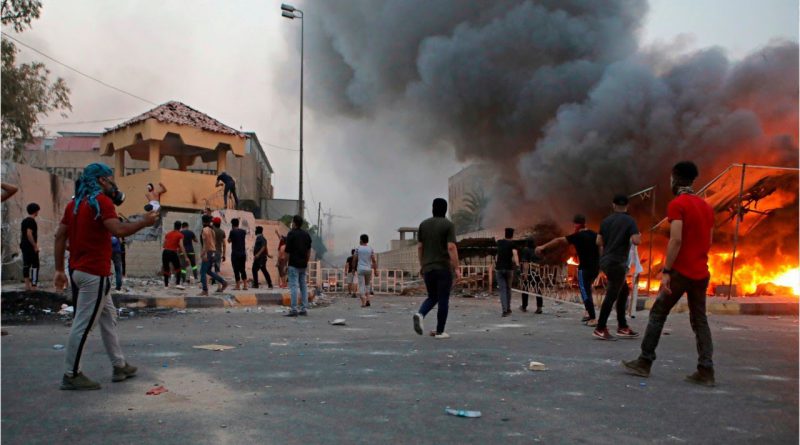U.S. embassy in Baghdad evacuated as protesters denounce U.S. air strikes
Baghdad (Reuters) – The U.S. ambassador to Iraq and other staff were evacuated from their embassy in Baghdad for their safety on Tuesday, Iraqi officials said, as thousands of protesters and militia fighters outside the gate denounced U.S. air strikes in Iraq.
On Sunday, U.S. planes had attacked bases belonging to an Iranian-backed militia, a move that risks drawing Iraq further into a proxy conflict between Washington and Tehran at a time when mass protests are challenging Iraq’s political system.
The attack on the Kataib Hezbollah militia was in response to the killing of a U.S. civilian contractor in a rocket attack on an Iraqi military base.
The two Iraqi foreign ministry officials did not say when the U.S. ambassador or other staff had left but added that a few embassy protection staff remained.
Outside the embassy, protesters threw stones at the gate while others chanted, “No, no, America! … No, no, Trump!” Iraqi special forces were deployed around the main gate to prevent them entering the embassy.
Iraqis have been taking to the streets in their thousands almost daily to condemn, among other things, militias such as Kataib Hezbollah and their Iranian patrons that support Iraqi Prime Minister Adel Abdul Mahdi’s government.
But on Tuesday, it was these militias who were spraying “Closed in the name of the people” on the gates of the U.S. Embassy and smashing the surveillance cameras around the building with bricks and stones.
Qais al-Khazali, leader of the Iranian-backed Asaib Ahl al-Haq militia, and many other senior militia leaders were among the protesters.
“Americans are unwanted in Iraq. They are a source of evil and we want them to leave,” Khazali told Reuters. Khazali is one of the most feared and respected Shi’ite militia leaders in Iraq, and one of Iran’s most important allies.
Kataib Hezbollah is one of the smallest but most potent Iranian-backed militias. Its flags were hung on the fence surrounding the embassy.
Militia commander Jamal Jaafar Ibrahimi, also known as Abu Mahdi al-Mohandes, and Badr Organisation leader Hadi al-Amiri were also at the protest.
Abdul Mahdi has condemned the air strikes, which killed at least 25 fighters and wounded 55.


